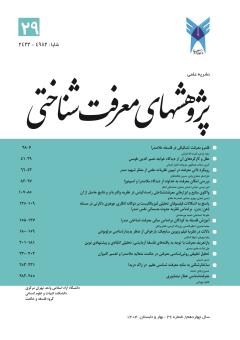List of Articles
-
Open Access Article
1 - The Real of Gradational Knowledge in Mullasadra Philosophy
قدرت الله قربانی zohre zarei -
Open Access Article
2 - Intellect and its Functions According to Khwaja Tusi Abstract
کبری سادات عبدالهی عزیزالله افشار کرمانی -
Open Access Article
3 - The intrinsic approach to knowledge in explanation scientific theories point of view Shahid Sadr
Hossein Malekshahiyan Ali Asghar Jafari Vlani -
Open Access Article
4 - Examining the possibility of knowing God from the perspective of Mulla Sadra and Spinoza
Anvar raissi Abbas Ahmadi Saadi Mohammad Ali Akhgar -
Open Access Article
5 - Analysis of Epistemological Sources and Tools of Orthodoxy in Walter Bauer’s Theory and Its Implications
aydin ziyaee behrooz haddadi Ahmad Reza Meftah -
Open Access Article
6 - Responding to the Objections of Analytical Physicalist Philosophers to Cartesian Substance Dualism in the Mind/Body Problem, Based on Mulla Sadra's Theory of the Corporeal Origination of the Soul
Alireza Esmaeili naeme poormohammadi -
Open Access Article
7 - A Study On Epistemological Foundations of Sadrian System for Teaching Philosophy
mohammad nasiri azam ghasemi roohollah karimi hadi vakili -
Open Access Article
8 - Signification in Vivian Sobchack's film theory: a re-reading from the perspective of Merleau-Ponty's phenomenology
ZAHRA MEHRABANPAZHOOH شهلا اسلامی -
Open Access Article
9 - Redefining Knowledge Based on the Findings of Experimental Philosophy
Ali Amanat Hadi Samadi -
Open Access Article
10 - A Comparative Analysis of the Epistemological Methodology in Mulla Sadra's Transcendent Theosophy and Tafsir al-Mizan
Hassan Hosseini -
Open Access Article
11 - Deconstruction as a Barren epistemology in Jacques Derrida
Hossein Zohdi Sehat -
Open Access Article
12 - Epistemology of Attar Neyshaburi
Tahereh Bahrami

